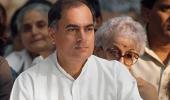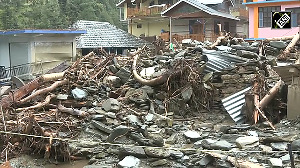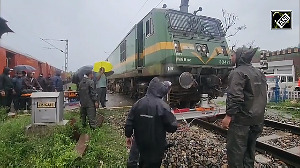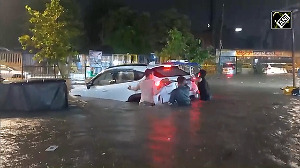''That it was the LTTE was known in three weeks's time.'
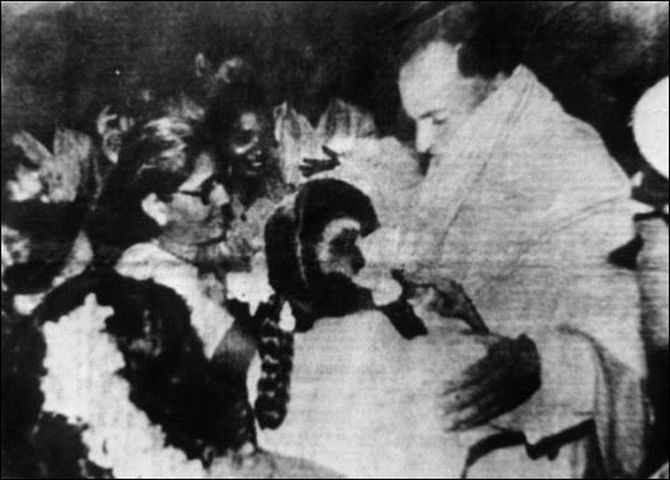
May 21 marks 30 years since Rajiv Gandhi was assassinated in Sriperumbudur.
It is a day in infamy that will never be forgotten.
The second of a four-part interview, which was first published on Rediff.com on April 9, 1998.
The man who investigated the most sensational murder case of the 1990s, the Rajiv Gandhi assassination, Devarayapuram Ramasamy Karthikeyan spoke to Rajesh Ramachandran for 90 minutes discussing the Rajiv Gandhi murder and the Liberation Tigers of Tamil Eelam.
At what stage did you conclude that it was the LTTE and nobody else who was behind the assassination?
That it was the LTTE was known in three weeks's time. But speculation started in about 10 days's time and within three weeks it became certain.
And as investigations progressed it was getting reinforced.
The LTTE and nobody else was there by the time we placed the chargesheet.
There is no clue about the involvement of anybody else, no evidence.
Everything else was in the realm of speculation by interested groups.
That is one reason.
Number two: By studying the character of the organisation.
They are not mercenaries.
They are not like many of our people who can be bought.
They are very committed, for them the cause is their mission.
They are prepared to sacrifice everything they have, hoping that the next generation will live in freedom.
Prabhakaran is not a mercenary. If he thinks for his purpose somebody has to go, he goes.
Not because somebody pays him money.
If somebody pays money, what is the money you can pay? Go ahead you quote a figure.
He would have got ten times this money by signing an agreement with the Sri Lankan government.
Or the Western mediators would have paid him to get the glory of solving the problem since any leader who solves the problem gets the Nobel Prize.
I am sure our own government would have paid ten times this much money to solve the problem. So I don't believe this theory of conspiracy, outside the LTTE.
The Jain Commission report is another matter.
I have always maintained that such a thorough meticulous investigation does not indicate the involvement of anybody else except those 42 people charge-sheeted in the case.
If you study the nature, character and activities of the LTTE you would know that they can't be ordered or persuaded or bought by someone.
They will not do it for somebody else.
So I firmly believe from the time I chargesheeted till today, that there cannot be the involvement of any other agency.
The Jain Commission sat through it for years with enormous powers.
I had limited powers as a police officer, limited time, yet I investigated a totally blind case and chargesheeted within 11 months.
The Jain Commission has no such compulsion, has summoned everybody, all the former prime ministers, all the top officers, documents from every ministry, he has seen even our papers, he is supposed to find out if there is anything. And obviously there is nothing.
You can't speculate on who could have done this.
That is not the point. But who did it?
Even you and I could have felt the possibilities.
So far as we are concerned the investigation has conclusively proved the hand of the LTTE.

Was there an element of luck in cracking the case? Which was the luckiest break you had in the case?
See, there is nothing called luck coming to you.
For a hardworking man whatever he finds you can call it luck.
You can also call it the result of labour.
A lazy man will call it luck.
This is the result of a very intelligent, totally dedicated sincere investigation.
What was the single biggest lead in tracking down Sivarasan?
Some of the important leads were the remnants of the belt bomb, the ten photographs of Haribabu's camera, the wireless transmissions which were intercepted and decoded were of great value for the investigation, information received through the telephonic calls, a few letters which came to us and some of the video cassettes.
So it is difficult to say which is the most important, all of them are of equal value.
The letters Subha and Dhanu sent before the assassination to Jaffna which were recovered later from Vedaranyam, letters recovered on the high seas which were being carried to Jaffna, Santham's letter we call them, all these were of great importance.
You can't underestimate any one of them. That is how it becomes an iron-clad case.
- PART III: Why wasn't Sivarasan caught alive?
Feature Presentation: Ashish Narsale/Rediff.com

